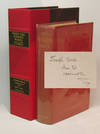

Jews in the Canary Islands. Being a Calendar of Jewish Cases Extracted from the Records of the Canariote Inquisition in the Collection of the Marquess of Bute.
by Wolf, Lucien
- Used
- Paperback
- first
- Condition
- See description
- Seller
-
Kanab, Utah, United States
Payment Methods Accepted
About This Item
The Jewish Historical Society of England. Printed for the Society by Spottiswoode, Ballantyne and Co. Ltdl, London, 1926. Documents the persecution of Jews in the Canary Islands by the Spanish. Jewish victims of the great Iberian expulsion of 1492 had settled in the Canary Islands. Jews persecuted in the Canary Islands (Canariote Inquisition) then resettled to England during the Commonwealth. This title is an important and scarce historical document. Original heavy paper wraps, printed on front cover and spine; 274 pp.; 10 1/8 x 7 5/8 inches. Fold-out map in rear (fine). Moderate browning and soiling of covers, mostly spine. Spine chipped at hinges and extremities, but printed title entirely intact. Triangular portion of upper corner of rear cover missing (1 5/8 x 1 1/4 inches in greatest dimensions). Despite starting at hinges, the binding is still substantially tight. Internally, pages are clean. Overall, very good, and quite attractive, with an antiquarian patina of external wear. Translated from the Spanish and edited, with an introduction and notes by Lucien Wolf. In the text, the Calendar of Jewish Cases spans from 1499 to 1818. Appendix (Process of Antao Rodrigues Lindo) and Index. A sample of this fascinating story: "Between 1523 and 1532 the happy Canaries --- the Fortunate Islands of the early voyagers --- suffered a series of calamities as strange as they were appalling. Plague broke out in Grand Canary and ravaged the whole island, and in its wake followed the horrors of famine. The inhabitants fled to the neighbouring islands where they created a panic which speedily took the form of religious exaltation. This was the opportunity for the Inquisitor Ximenes, who at last found a congenial public opinion to appeal to. The awful visitations were pictured by him as manifestations of divine wrath on account of the tolerance of Judaical and Mohammedan backsliders, who celebrated in secret the rites of the detestable heresies they had solemnly pledged themselves to abandon. To appease the Almighty Don Martin set out on the warpath against the heretics, and laid his plans for a public Auto de Fe, on the tragical model of the Mother Church in Seville. Towards the end of May 1524 a batch of edicts were promulgated in his name, and duly published in the Cathedral Church of St. Ana in Las Palmas. The first was a general call for the extirpation of heresy and the confession of erroneous practices. The second was aimed specifically at Jews and Moors, and gave an account of their religious and social manners and customs at great length. This document is exceedingly interesting a a record of the Jewish ceremonies and customs which had survived among the Conversos, and was of course very useful in enabling gossips and informers to detect the heretics or to invent charges against persons who had incurred their resentment or envy. A third edict prohibited masters, owners, and captains of ships, visiting and leaving the Canariote ports, from taking on board or giving passage abroad to 'converts or New Christians, converted to our Holy Catholic Faith from Judaism,' under pain of excommunication and confiscation of their ships and other property. The other edicts are not of specific Jewish interest. The effect of this appeal to the religious maniacs was soon made apparent by the large number of denunciations which poured into the Holy Office between 1524 and 1526. On these denunciations formal prosecutions were founded, and eventually eight of the accused were condemned to be 'relaxed' or burnt alive, ten were 'reconciled,' and two were 'penanced.' Eleven of these unhappy creatures were relapsed Jews or Jewesses, six figuring among the Relaxados, four among the Reconciliados, and one among the Penitenciados." (3214021). F. Soft cover.
Reviews
(Log in or Create an Account first!)
Details
- Bookseller
- Boojum and Snark Books
(US)
- Bookseller's Inventory #
- 61
- Title
- Jews in the Canary Islands. Being a Calendar of Jewish Cases Extracted from the Records of the Canariote Inquisition in the Collection of the Marquess of Bute.
- Author
- Wolf, Lucien
- Format/Binding
- Paperback
- Book Condition
- Used
- Edition
- F
- Publisher
- The Jewish Historical Society of England. Printed for the Society by Spottiswoode, Ballantyne and Co. Ltdl, London, 1926.
- Keywords
- SPAIN, JUDIISM, JUDAICA, ENGLAND, CANARY ISLANDS, INQUISITION, ENGLISH JEWS, COMMONWEALTH
Terms of Sale
Boojum and Snark Books
Books returnable within two weeks of receipt if not as described and if returned in the same condition in which they were sent. Ask for return authorization before returning. Call or email to hold.
About the Seller
Boojum and Snark Books
Biblio member since 2003
Kanab, Utah
About Boojum and Snark Books
General antiquarian and out-of-print books. Specializing in medicine, history of medicine, science, technology and technical books.
Glossary
Some terminology that may be used in this description includes:
- New
- A new book is a book previously not circulated to a buyer. Although a new book is typically free of any faults or defects, "new"...
- Tight
- Used to mean that the binding of a book has not been overly loosened by frequent use.
- Spine
- The outer portion of a book which covers the actual binding. The spine usually faces outward when a book is placed on a shelf....

